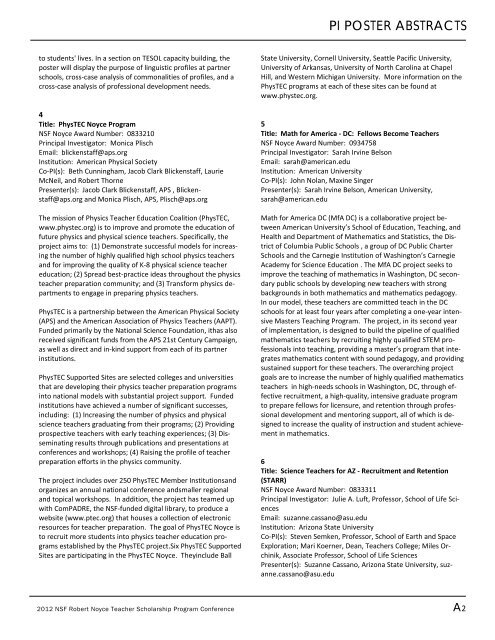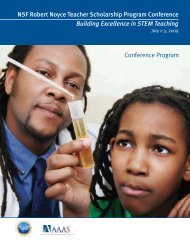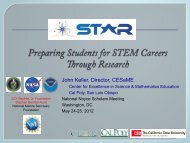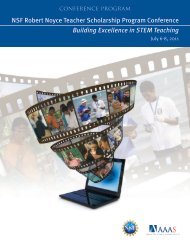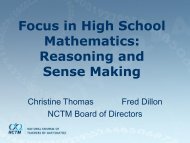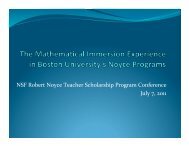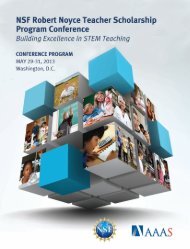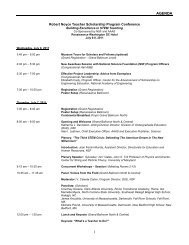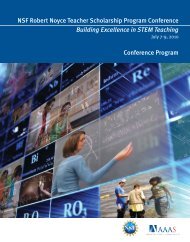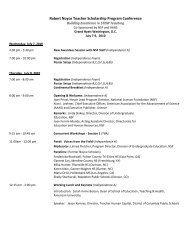PI POSTER ABSTRACTS1Title: Teachers of Mathematics Scholars: 1st Graduating Cohortand their Teaching and Learning ExperiencesNSF <strong>Noyce</strong> Award Number: 0934756Principal Investigator: <strong>Robert</strong> BradleyEmail: tawfeeq@adelphi.eduInstitution: Adelphi UniversityCo‐PI(s): Dante A. Tawfeeq and Salvatore PetrilliPresenter(s): Dante A. TawfeeqThis 1st cohort of Teachers of Mathematics <strong>Scholarship</strong> (TOMS)scholars will graduate from Adelphi University during this springof <strong>2012</strong>. During the student teaching of this graduating cohort,the TOMS scholars used pedagogies that promoted the developmentof mathematical learning among Black and Latino/a students.<strong>The</strong> emphasis placed on pedagogies that promoted thelearning of mathematics was motivated by concepts investigatedin 4 courses that were designed specifically for the TOMS program:(1) Methods of Teaching College Placement Calculus; (2)Methods of Teaching Geometry; (3) Issues of Learning Mathematicsin High‐Needs Schools: Race, Gender, Equity, and SocialJustice; and (4) Measurement and Evaluation of School‐basedMathematics Learning <strong>Program</strong>s and Testing. Issues related toBlack and Latino/a students’ performance on the AP Calculusexam, the SAT, as well as other mathematics based assessmentspropelled many of the discussions that occurred in the courseslisted above. <strong>The</strong> TOMS scholars, as student teachers, confrontedmany of the issues that were discussed in the courseslisted above.This presentation will provide a snapshot of the teaching andlearning experiences of this graduating cohort of TOMS scholarsas well as descriptive information about the performances ofBlack and Latino/a students on the AP Calculus exam and howthis cohort of TOMS scholars interpreted this information. <strong>The</strong>performance of Black and Latino/a students on the AP Calculusexam become an important point of discussion as it stimulatedthe interest of the TOMS scholars, relative to equity and culturalresponsive pedagogies.2Title: Adelphi University Science Education Advancement (SEA)<strong>Program</strong>/NSF <strong>Robert</strong> <strong>Noyce</strong> Teacher <strong>Scholarship</strong> <strong>Program</strong>NSF <strong>Noyce</strong> Award Number: 1136380Principal Investigator: Tracy HoganEmail: hogan@adelphi.eduInstitution: Adelphi UniversityCo‐PI(s): Beth ChristensenPresenter(s): Tracy Hogan, Adelphi University, hogan@adelphi.edu<strong>The</strong> Adelphi University Science Education Advancement (SEA)<strong>Program</strong>is designed to encourage through scholarship support26 individuals majoring in the sciences and those trained inSTEM fields to consider a teaching career in science educationand commit to teaching in a high needs public school to provideeffective and engaging science instruction. It has the followinggoals: 1) enhancing and broadening strong partnerships betweenLong Island high needs school sites, University faculty andadministration, and regional informal learning environments; 2)responding to the critical need for secondary science teachers byincentivizing, through scholarship support, the completion of arigorous teaching credentialing program by Scholars; 3) mentoringsupport for the Scholars throughout the program and duringtheir first three years of teaching; 4) candidate development ofeffective teaching practices and behaviors through participationof the National Board for Professional Teaching Standards(NBPTS) Take One! <strong>Program</strong>; 5) Scholar engagement in twounique field‐based marine science courses exploring both themarine environments of Long Island through shipboard experienceswith a professional marine educator and a travel abroadprogram led by Adelphi University scientists; and 6) serve as anintern with Nassau Board Of Cooperative Education Services(BOCES) Summer Marine Biology <strong>Program</strong> working closely withnaturalists in preparing and implementing science field experiencesfor students in grades 8‐12.It is a shared vision among the project stakeholders (includingexperts in school administration, science pedagogy, science content,and testing/measurement), that the 1) focus on marinesciences as a vehicle for the teaching and learning of all sciencedisciplines and 2) preparing teachers to use marine environmentsin their own curriculum holds great promise for the improvementof science education in a region spanning from NewYork City to the far reaches of Long Island and potentially impactingthe science learning experience of thousands of students;a region comprised of a mosaic of over 130 school districtson the edge of some of the most important yet over‐usedcoastal environments found along the Atlantic seaboard.3Title: Masters Residency <strong>Program</strong> at the American Museum ofNatural HistoryNSF <strong>Noyce</strong> Award Number: 1136306Principal Investigator: Maritza MacdonaldEmail: mmacdonald@amnh.orgInstitution: American Museum of Natural HistoryCo‐PI(s): Ro KinzlerPresenter(s): Maritza Macdonald, American Museum of NaturalHistory, Department of Education, mmacdonald@amnh.org<strong>The</strong> poster explores the new Master of Arts in Teaching <strong>Program</strong>in Earth Science at the museum. <strong>The</strong> poster addresses topics ofresidency design, mentoring, program‐wide TESOL capacitybuilding, and required common and pedagogy knowledge. <strong>The</strong>MAT program employs extensive mentoring and extensive use oftechnology to provide candidates with a deep understanding ofscientific content and of the importance of an inquiry‐basedapproach to learning that demonstrates the relevance of scienceA1<strong>2012</strong> NSF <strong>Robert</strong> <strong>Noyce</strong> Teacher <strong>Scholarship</strong> <strong>Program</strong> <strong>Conference</strong>
PI POSTER ABSTRACTSto students' lives. In a section on TESOL capacity building, theposter will display the purpose of linguistic profiles at partnerschools, cross‐case analysis of commonalities of profiles, and across‐case analysis of professional development needs.4Title: PhysTEC <strong>Noyce</strong> <strong>Program</strong>NSF <strong>Noyce</strong> Award Number: 0833210Principal Investigator: Monica PlischEmail: blickenstaff@aps.orgInstitution: American Physical SocietyCo‐PI(s): Beth Cunningham, Jacob Clark Blickenstaff, LaurieMcNeil, and <strong>Robert</strong> ThornePresenter(s): Jacob Clark Blickenstaff, APS , Blickenstaff@aps.organd Monica Plisch, APS, Plisch@aps.org<strong>The</strong> mission of Physics Teacher Education Coalition (PhysTEC,www.phystec.org) is to improve and promote the education offuture physics and physical science teachers. Specifically, theproject aims to: (1) Demonstrate successful models for increasingthe number of highly qualified high school physics teachersand for improving the quality of K‐8 physical science teachereducation; (2) Spread best‐practice ideas throughout the physicsteacher preparation community; and (3) Transform physics departmentsto engage in preparing physics teachers.PhysTEC is a partnership between the American Physical Society(APS) and the American Association of Physics Teachers (AAPT).Funded primarily by the National Science Foundation, ithas alsoreceived significant funds from the APS 21st Century Campaign,as well as direct and in‐kind support from each of its partnerinstitutions.PhysTEC Supported Sites are selected colleges and universitiesthat are developing their physics teacher preparation programsinto national models with substantial project support. Fundedinstitutions have achieved a number of significant successes,including: (1) Increasing the number of physics and physicalscience teachers graduating from their programs; (2) Providingprospective teachers with early teaching experiences; (3) Disseminatingresults through publications and presentations atconferences and workshops; (4) Raising the profile of teacherpreparation efforts in the physics community.<strong>The</strong> project includes over 250 PhysTEC Member Institutionsandorganizes an annual national conference andsmaller regionaland topical workshops. In addition, the project has teamed upwith ComPADRE, the NSF‐funded digital library, to produce awebsite (www.ptec.org) that houses a collection of electronicresources for teacher preparation. <strong>The</strong> goal of PhysTEC <strong>Noyce</strong> isto recruit more students into physics teacher education programsestablished by the PhysTEC project.Six PhysTEC SupportedSites are participating in the PhysTEC <strong>Noyce</strong>. <strong>The</strong>yinclude BallState University, Cornell University, Seattle Pacific University,University of Arkansas, University of North Carolina at ChapelHill, and Western Michigan University. More information on thePhysTEC programs at each of these sites can be found atwww.phystec.org.5Title: Math for America ‐ DC: Fellows Become TeachersNSF <strong>Noyce</strong> Award Number: 0934758Principal Investigator: Sarah Irvine BelsonEmail: sarah@american.eduInstitution: American UniversityCo‐PI(s): John Nolan, Maxine SingerPresenter(s): Sarah Irvine Belson, American University,sarah@american.eduMath for America DC (MfA DC) is a collaborative project betweenAmerican University’s School of Education, Teaching, andHealth and Department of Mathematics and Statistics, the Districtof Columbia Public Schools , a group of DC Public CharterSchools and the Carnegie Institution of Washington’s CarnegieAcademy for Science Education . <strong>The</strong> MfA DC project seeks toimprove the teaching of mathematics in Washington, DC secondarypublic schools by developing new teachers with strongbackgrounds in both mathematics and mathematics pedagogy.In our model, these teachers are committed teach in the DCschools for at least four years after completing a one‐year intensiveMasters Teaching <strong>Program</strong>. <strong>The</strong> project, in its second yearof implementation, is designed to build the pipeline of qualifiedmathematics teachers by recruiting highly qualified STEM professionalsinto teaching, providing a master’s program that integratesmathematics content with sound pedagogy, and providingsustained support for these teachers. <strong>The</strong> overarching projectgoals are to increase the number of highly qualified mathematicsteachers in high‐needs schools in Washington, DC, through effectiverecruitment, a high‐quality, intensive graduate programto prepare fellows for licensure, and retention through professionaldevelopment and mentoring support, all of which is designedto increase the quality of instruction and student achievementin mathematics.6Title: Science Teachers for AZ ‐ Recruitment and Retention(STARR)NSF <strong>Noyce</strong> Award Number: 0833311Principal Investigator: Julie A. Luft, Professor, School of Life SciencesEmail: suzanne.cassano@asu.eduInstitution: Arizona State UniversityCo‐PI(s): Steven Semken, Professor, School of Earth and SpaceExploration; Mari Koerner, Dean, Teachers College; Miles Orchinik,Associate Professor, School of Life SciencesPresenter(s): Suzanne Cassano, Arizona State University, suzanne.cassano@asu.edu<strong>2012</strong> NSF <strong>Robert</strong> <strong>Noyce</strong> Teacher <strong>Scholarship</strong> <strong>Program</strong> <strong>Conference</strong>A2
- Page 1 and 2: NSF Robert Noyce Teacher Scholarshi
- Page 3 and 4: NSF Robert Noyce Teacher Scholarshi
- Page 5 and 6: CONTENTSAbout the NSF Robert Noyce
- Page 7 and 8: AGENDAWEDNESDAY, MAY 23, 20123:30 p
- Page 9 and 10: HOTEL FLOOR PLANS2012 NSF Robert No
- Page 11 and 12: SPEAKER BIOGRAPHIESL’Oreal USA an
- Page 14 and 15: WORKSHOP ABSTRACTSSession I: Thursd
- Page 16 and 17: WORKSHOP ABSTRACTSTarget Audience:
- Page 18 and 19: WORKSHOP ABSTRACTS1.8 Preparing Noy
- Page 20 and 21: WORKSHOP ABSTRACTStutorials for usi
- Page 22 and 23: WORKSHOP ABSTRACTSentation, three o
- Page 24 and 25: WORKSHOP ABSTRACTS2.9 Science NetLi
- Page 26 and 27: WORKSHOP ABSTRACTS2.14 Understandin
- Page 31 and 32: WORKSHOP ABSTRACTSThis session will
- Page 33: WORKSHOP ABSTRACTSColleges for Teac
- Page 36 and 37: WORKSHOP ABSTRACTSlesson and will p
- Page 40 and 41: PI POSTER ABSTRACTSJulie A. Luft, A
- Page 42 and 43: PI POSTER ABSTRACTSClinical experie
- Page 44 and 45: PI POSTER ABSTRACTSon topics includ
- Page 46 and 47: PI POSTER ABSTRACTSof the group at
- Page 48 and 49: PI POSTER ABSTRACTSopportunities. E
- Page 50 and 51: PI POSTER ABSTRACTS3. Partnership w
- Page 52 and 53: PI POSTER ABSTRACTSpated in four ty
- Page 54 and 55: PI POSTER ABSTRACTS41Title: Teacher
- Page 56 and 57: PI POSTER ABSTRACTSpost‐baccalaur
- Page 58 and 59: PI POSTER ABSTRACTSThe internships
- Page 60 and 61: PI POSTER ABSTRACTSin the degree pr
- Page 62 and 63: PI POSTER ABSTRACTSPresenter(s): Ro
- Page 64 and 65: PI POSTER ABSTRACTSSanthi Prabahar,
- Page 66 and 67: PI POSTER ABSTRACTSNicholle Stark,
- Page 68 and 69: PI POSTER ABSTRACTSprograms and dis
- Page 70 and 71: PI POSTER ABSTRACTSresulting in tea
- Page 72 and 73: PI POSTER ABSTRACTSyears. We have m
- Page 74 and 75: PI POSTER ABSTRACTSschool district,
- Page 76 and 77: PI POSTER ABSTRACTS95Title: The Noy
- Page 78 and 79: PI POSTER ABSTRACTS101Title: SUNY C
- Page 80 and 81: PI POSTER ABSTRACTSresources and su
- Page 82 and 83: PI POSTER ABSTRACTSThis project als
- Page 84 and 85: PI POSTER ABSTRACTSThe UCR Noyce Sc
- Page 86 and 87: PI POSTER ABSTRACTSInstitution: Uni
- Page 88 and 89:
PI POSTER ABSTRACTSedge through the
- Page 90 and 91:
PI POSTER ABSTRACTSand program cont
- Page 92 and 93:
PI POSTER ABSTRACTS136Title: Title:
- Page 94 and 95:
PI POSTER ABSTRACTSIn addition, the
- Page 96 and 97:
PI POSTER ABSTRACTSgoals for next y
- Page 98 and 99:
PI POSTER ABSTRACTS152Title: Univer
- Page 100 and 101:
PI POSTER ABSTRACTSCo‐PI(s): Susa
- Page 102 and 103:
PI POSTER ABSTRACTSwork samples fro
- Page 104 and 105:
PI POSTER ABSTRACTSPresenter(s): Mi
- Page 106 and 107:
PI POSTER ABSTRACTSThe action resea
- Page 108 and 109:
PI POSTER ABSTRACTSin‐service tea
- Page 110 and 111:
SCHOLAR/FELLOW POSTER ABSTRACTSward
- Page 112 and 113:
SCHOLAR/FELLOW POSTER ABSTRACTSers
- Page 114 and 115:
SCHOLAR/FELLOW POSTER ABSTRACTSS/F1
- Page 116 and 117:
SCHOLAR/FELLOW POSTER ABSTRACTScert
- Page 118 and 119:
SCHOLAR/FELLOW POSTER ABSTRACTSThis
- Page 120 and 121:
SCHOLAR/FELLOW POSTER ABSTRACTSS/F4
- Page 122 and 123:
SCHOLAR/FELLOW POSTER ABSTRACTSS/F5
- Page 124 and 125:
SCHOLAR/FELLOW POSTER ABSTRACTSthe
- Page 127 and 128:
POSTER ABSTRACT INDEXAAbraham, Larr
- Page 129 and 130:
POSTER ABSTRACT INDEXEscalante, Mic
- Page 131 and 132:
POSTER ABSTRACT INDEXLandon, Laurie
- Page 133 and 134:
POSTER ABSTRACT INDEXRodriguez, Jen
- Page 135:
POSTER ABSTRACT INDEXZZaikowski, Lo


